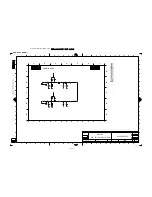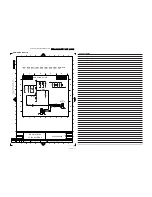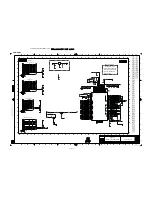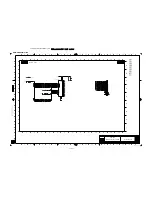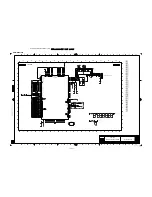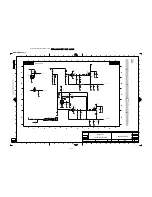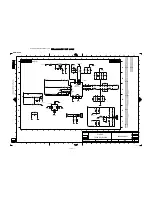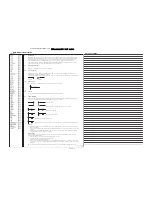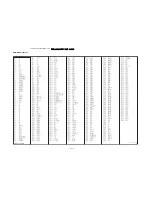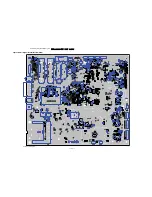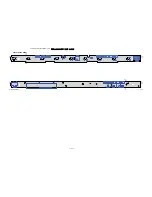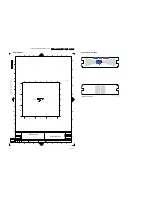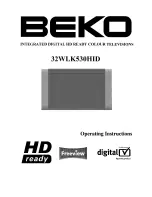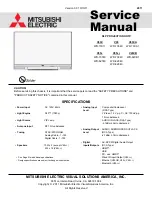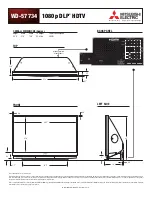
EN 134
Q549.2E LA
10.
Circuit Diagrams and PWB Layouts
2009-May-08
SSB: SRP List Explanation
1 . 1 . Introduction
Example
S
RP (
S
ervice Re ference Protocol) i
s
a
s
oftw
a
re too l th
a
t cre
a
te
s
a
li
s
t w i th
a
ll refer e n c e
s
to
s
ign
a
l line
s
. The li
s
t cont
a
in
s
reference
s
to the
s
ign
a
l
s
w i thin
a
ll
s
chem
a
t ic
s
of
a
PWB. It repl
a
ce
s
the text refe r ence
s
c
u
rrentl y p r inted next t o the
s
ign
a
l
n
a
me
s
in the
s
chem
a
tic
s
. The
s
e printed refe rence
s
a
re cre
a
ted m
a
n
ua
lly
a
n d
a
re t h e r efore n o t g
ua
r
a
n teed to
b
e 100
%
correct. In
a
dditio n , in the c
u
rrent crowded
s
chem
a
t ic
s
there i
s
often none or ver y little pl
a
ce for the
s
e reference
s
.
S
ome of the PW B
s
chem
a
tic
s
w ill
us
e
S
RP while other
s
w ill
s
ti ll
us
e the m
a
n
ua
l refe rence
s
. Either there w ill
b
e
a
n
S
RP
r e fer ence li
s
t for
a
s
chem
a
tic, or ther e w ill
b
e pr inted r e ference
s
in the
s
chem
a
tic.
1.2. No
n -
S
RP
S
chematic
s
There
a
r e
s
ever
a
l different
s
ign
a
l
s
a
v
a
il
ab
le in
a
s
chem
a
tic:
1.2.1. Po
w e r
S
upply
Line
s
All pow er
su
ppl y line
s
a
re
a
v
a
il
ab
le in t he
su
ppl y line overview (
s
ee ch
a
pter 6). I n th e
s
chem
a
tic
s
(
s
e e ch
a
pter 7) i
s
n o t
indic
a
ted w h e r e
su
pplie
s
a
re coming from or going to.
It i
s
how ever indi c
a
ted if
a
su
pply i
s
incoming (cre
a
ted el
s
ew h e r e), o r o
u
tgoing (cr e
a
t ed or
a
d
a
pt ed in the c
u
rrent
s
che m
a
tic).
+5 V
+5 V
O
u
tgoing
Incoming
1.2.2. Normal
S
i
g
nal
s
For no rm
a
l
s
ign
a
l
s
,
a
s
chem
a
tic r e ference (e. g . B1 4
b
) i
s
pl
a
ced next to the
s
ign
a
l
s
.
s
i gn
a
l _n
a
m e
B 14
b
1.2.
3
. Ground
s
For no rm
a
l
a
nd
s
peci
a
l gro
u
nd
s
(e .g. GN DH OT o r GND
3
V
3
etc.), n o thing i
s
indic
a
te d.
1.
3
.
S
RP
S
chematic
s
S
RP i
s
a
tool, w h ich
au
tom
a
tic
a
lly cre
a
te
s
a
li
s
t w i th
s
ign
a
l reference
s
, indic
a
ting on which
s
c hem
a
tic t he
s
ign
a
l
s
a
re
us
ed.
A reference i
s
cr e
a
ted for
a
ll
s
ign
a
l
s
indic
a
t ed w i th
a
n
S
RP
s
y m
b
ol, the
s
e
s
y m
b
ol
s
a
re:
+5 V
+5 V
Power
su
ppl y li ne.
n
a
m e
n
a
m e
S
t
a
nd
a
lone
s
ign
a
l or
s
w itching li ne (
us
ed
as
le
ss
as
po
ss
i
b
le).
n
a
m e
n
a
m e
S
ign
a
l line into
a
w i re tree.
n
a
m e
n
a
m e
S
w itching line into
a
w i re tre e .
n
a
m e
Bi-direction
a
l lin e (e.g.
S
DA ) into
a
w i r e tree.
n
a
m e
S
ign
a
l line into
a
w i r e tree, it
s
dir e ction depend
s
on t he circ
u
it (e.g. ingoing for PD P, o
u
tgoing for L C D
s
et
s
).
Remark
s
:
•
When there i
s
a
b
l
a
ck dot on the "
s
ign
a
l dire ction
a
rrow" it i
s
a
n
S
RP
s
ym
b
ol,
s
o there will
b
e
a
reference to the
s
ign
a
l
n
a
me in the
S
RP li
s
t.
•
All reference
s
to norm
a
l gro
u
nd
s
(Gro
u
nd
s
ym
b
ol
s
witho
u
t
a
dditi on
a
l text)
a
re not li
s
ted in the reference li
s
t, thi
s
to keep
it conci
s
e.
•
S
ign
a
l
s
th
a
t
a
re not
us
ed in m
u
ltiple
s
chem
a
tic
s
,
bu
t only onc e or
s
ever
a
l time
s
in the
sa
me
s
chem
a
tic,
a
re incl
u
ded
in the
S
RP reference li
s
t,
bu
t only with one reference.
Additional Tip:
When
us
ing the PDF
s
ervice m
a
n
ua
l file, yo
u
c
a
n very e
as
ily
s
e
a
rch for
s
ign
a
l n
a
me
s
a
nd follow the
s
ign
a
l over
a
ll the
s
chem
a
tic
s
. In Ado
b
e PDF re
a
der:
•
S
elect the
s
ign
a
l n
a
me yo
u
w
a
nt to
s
e
a
r ch for, with the "
S
elect text" tool.
•
Copy
a
nd p
as
te the
s
ign
a
l n
a
me in the "
S
e
a
rch PDF" tool.
•
S
e
a
rch for
a
ll occ
u
rrence
s
of the
s
ign
a
l n
a
me.
•
Now yo
u
c
a
n
qu
ickly j
u
mp
b
etween the different occ
u
rrence
s
a
nd follow the
s
ign
a
l over
a
ll
s
chem
a
tic
s
. It i
s
a
dvi
s
ed to
"zoom in" to e.g. 150
%
to
s
ee cle
a
rly, which text i
s
s
elect ed. Then yo
u
c
a
n zoom o
u
t, to get
a
n overview of the complete
s
chem
a
tic.
P
S
.
It i
s
recommended to
us
e
a
t le
as
t Ado
b
e PDF (re
a
der) ver
s
ion 6. x, d
u
e to
b
etter
s
e
a
rch po
ss
i
b
ilitie
s
in thi
s
ver
s
ion.
10000_0
3
1_090121.ep
s
090121
Net Name
Dia
g
ram
+12-15V AP1
(4x)
+12-15V AP4
(4x)
+12-15V AP5
(12x)
+12-15V AP6
(4x)
+12-15V AP7
(
8
x)
+12V AP1
(4x)
+12V_NF AP1
(2x)
+12VAL AP1
(2x)
+25VLP AP1
(4x)
+25VLP AP2
(1x)
+
3
V
3
-
S
TANDBY AP5
(
3
x)
+400V-F AP1
(2x)
+400V-F AP2
(2x)
+400V-F AP
3
(2x)
+5V2 AP1
(6x)
+5V2 AP2
(1x)
+5V2-NF AP1
(1x)
+5V2-NF AP2
(1x)
+5V-
S
W AP1
(6x)
+5V-
S
W AP2
(1x)
+
8
V6 AP1
(
3
x)
+AUX AP1
(2x)
+AUX AP2
(1x)
+DC-F AP1
(2x)
+DC-F AP
3
(2x)
+
S
UB-
S
PEAKER AP5
(1x)
+
S
UB-
S
PEAKER AP6
(2x)
-12-15V AP1
(4x)
-12-15V AP4
(6x)
-12-15V AP5
(14x)
-12-15V AP6
(6x)
-12-15V AP7
(
8
x)
AL-OFF AP1
(2x)
AUDIO-L AP4
(1x)
AUDIO-L AP5
(1x)
AUDIO-PROT AP5
(
3
x)
AUDIO-R AP4
(1x)
AUDIO-R AP5
(1x)
AUDIO-
S
W AP5
(1x)
AUDIO-
S
W AP7
(1x)
BOO
S
T AP1
(2x)
CPROT AP4
(2x)
CPROT AP5
(1x)
CPROT-
S
W AP5
(1x)
CPROT-
S
W AP6
(2x)
-DC-F AP1
(2x)
-DC-F AP
3
(2x)
DC-PROT AP1
(1x)
DC-PROT AP5
(2x)
DIM-CONTROL AP1
(2x)
F
S
W AP6
(2x)
FEEDBACK-L AP4
(2x)
FEEDBACK-R AP4
(2x)
FEEDBACK-
S
W AP6
(2x)
GND-AL AP1
(2x)
GNDHA AP1
(40x)
GNDHA AP2
(20x)
GNDHA AP
3
(2x)
GNDHOT AP
3
(2x)
GND-L AP1
(2x)
GND-L AP4
(4x)
GND-L AP5
(
3
4x)
GND-LL AP4
(7x)
GND-LL AP5
(1x)
GND-LR AP4
(7x)
GND-LR AP5
(1x)
GND-L
S
W AP5
(1x)
GND-L
S
W AP6
(15x)
GND-
S
AP1
(11x)
GND-
S
A AP4
(
8
x)
GND-
S
A AP5
(2x)
GND-
S
A AP6
(
8
x)
GND-
S
A AP7
(6x)
GND
s
crew AP
3
(2x)
GND
s
crew AP5
(2x)
GND-
SS
B AP5
(
3
x)
GND-
SS
P AP1
(51x)
GND-
SS
P AP2
(15x)
IN+
S
W AP6
(2x)
IN-L AP4
(2x)
IN-R AP4
(2x)
IN-
S
W AP6
(2x)
INV-MUTE AP4
(1x)
INV-MUTE AP5
(1x)
INV-MUTE AP6
(1x)
LEFT-
S
PEAKER AP4
(1x)
LEFT-
S
PEAKER AP5
(1x)
MUTE AP4
(2x)
MUTE AP5
(1x)
MUTE AP6
(2x)
ON-OFF AP1
(
3
x)
OUT AP6
(1x)
OUT AP7
(2x)
OUTN AP6
(1x)
OUTN AP7
(1x)
POWER-GOOD AP1
(2x)
POWER-OK-PLATFORM AP1
(2x)
RIGHT-
S
PEAKER AP4
(1x)
RIGHT-
S
PEAKER AP5
(1x)
S
OUND-ENABLE AP5
(
3
x)
S
TANDBY AP1
(5x)
S
TANDBY AP2
(1x)
-
S
UB-
S
PEAKER AP5
(1x)
-
S
UB-
S
PEAKER AP6
(2x)
V-CLAMP AP1
(1x)
V-CLAMP AP
3
(2x)
Per
s
onal Note
s
:

